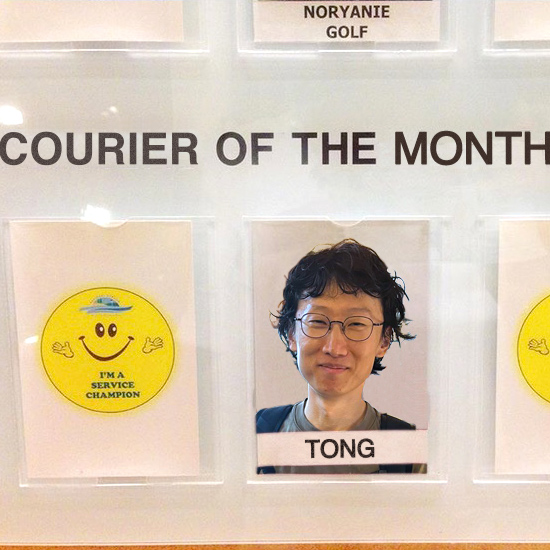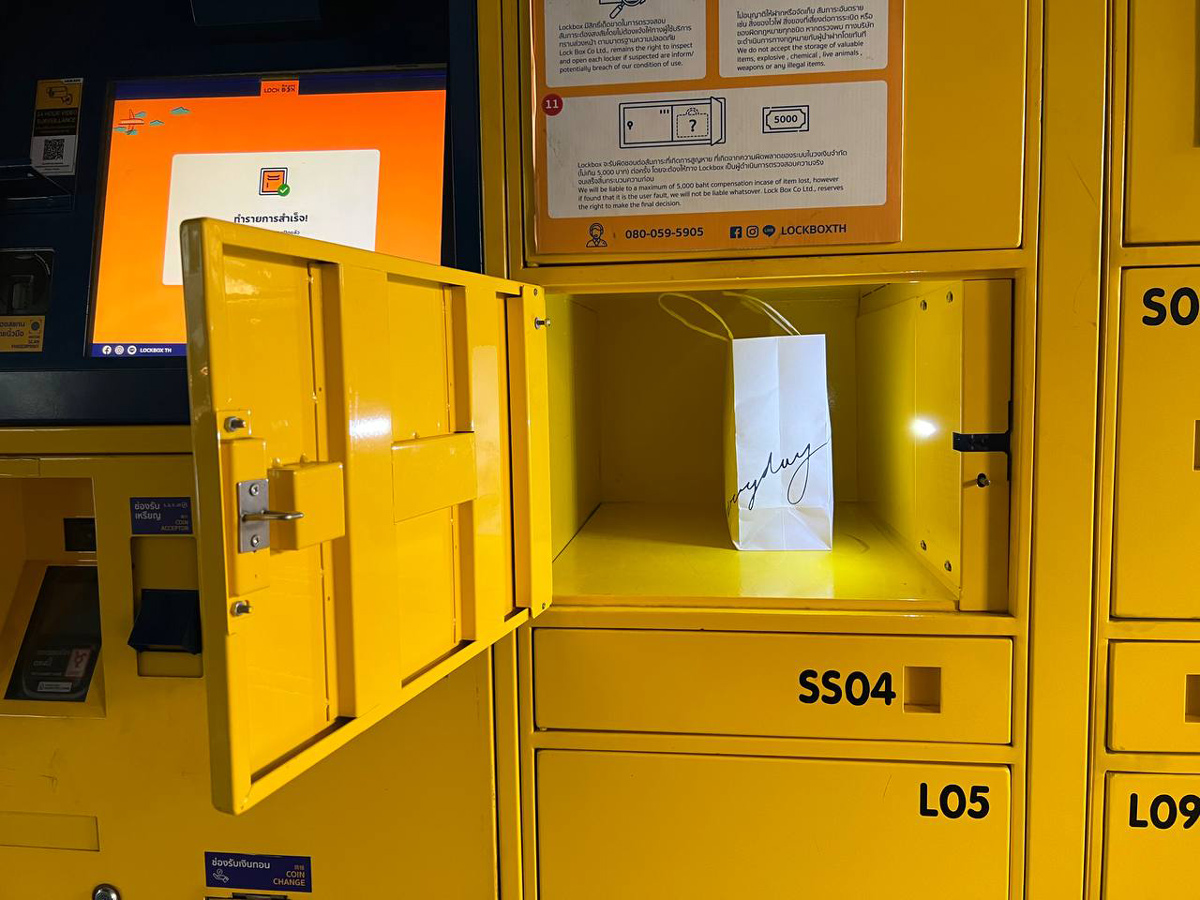
在Sala Daeng輕軌站(近Silom Complex出口)的快遞取件櫃,曼谷 // 照片自:KT [HQL-543]
新年伊始的「龍年慢遞員」 🐲 Dragon Courier to begin the New Year
HQL-532的收件人CAO(也是後來HQL-547的慢遞員之一),將展銷場的「後勤慢遞」項目推介給住在科隆的朋友TONG。出自對項目的好奇,TONG報名加入慢遞網絡,在短短一個月裡護送了HQL-543、HQL-547和HQL-548三份慢遞去到各種收件人那裡。對展銷場來說,這是「異常高效」的跨地域行動!出於對TONG這趟「慢遞之旅」的好奇,我們在採訪TONG的過程中了解到:為什麼物流也是他的生活。我們並不爭取效率,但還是很高興地稱譽TONG為展銷場2024年2月份的「月度最佳慢遞員」。
The RECEIVER of dispatch HQL-532, struck by the project and also later a courier for HQL-547, introduced LIGHT LOGISTICS to her friend TONG, based in Cologne. Curious, he signed up to join the courier network, and in the short span of one month managed to carry three dispatches (HQL-543, HQL-547, and HQL-548) to various destinations spanning the globe. An unusual, ‘high productivity’ action for the likes of Display Distribute, we also became curious as to why he would be interested to turn his journey into a camel-ing affair, so we took the opportunity of our pleasurable meetings with him to invite him for an interview. While this honour seeks not to give praise to efficiency, we are still very happy to name TONG Display Distribute’s February 2024 courier-of the-month. Congratulations!
展銷場易拎 PORTABLE (Display Distribute): 首先可以介紹一下自己嗎,什麼吸引你來試試走慢遞?
First of all, can you introduce yourself a bit? What attracted you to take on a courier route?
TONG: 很榮幸受到你們的採訪!我是TONG,專業背景是人機交互(HCI),去年剛研究生畢業,目前在做科研。因為我的研究課題是sustainable shopping behavior,所以我只要有機會就會詢問其他人對這個課題的看法,目的是讓自己能受到些啓發。當我和朋友CAO談到這個話題時她就提到了展銷場LIGHT LOGISTICS這個案例。我一開始想到的是現在越來越快的運送服務會導致快遞公司更頻繁的運送,增加碳排放,而LIGHT LOGISTICS不用快遞,所以這個概念應該會減少碳排(但現在發現我當時想的並不完全對,後面會提到)。另一方面,在HCI的背景下研究behavioural change讓我意識到人們做事情(activity)的推動力與科技本身沒有太大的關係,technology大多情況下只能作為mediator把activity呈現給用戶,至於用戶到底去不去做關鍵看這個activity本身有沒有吸引力,會不會給予用戶潛在的積極回報。所以,我一直就在想什麼activity吸引人們去參與。LIGHT LOGISTICS在我眼中就是這樣一種activity,我就覺得這個概念非常的refreshing,它吸引我去體驗。CAO也提到這種慢遞也使得貨物在運送過程中更容易發生一些意想不到的事,讓運送本身更具有趣味性。所以我就想知道真正去做是什麼感覺。碰巧沒過多久我還不得不去一趟香港,所以就體驗了一下。
I’m really honoured to be interviewed by you all! My name is TONG, and my background is in human-computer interaction (HCI). I just finished my masters last year and am now doing research work. Because my research topic is in sustainable shopping behaviour, I will grab any opportunity to ask others what they think about it as well. I’d like to keep learning more. When I was talking about it with CAO, she brought up Display Distribute’s LIGHT LOGISTICS as an example. My first thought was how the increasing speed of delivery services lead to courier companies operating more frequently, leading to greater carbon emissions. LIGHT LOGISTICS does not work with courier companies, though, so their idea supports reducing carbon emissions (although I realise now that this initial thought is not entirely accurate; I’ll talk more about this later). At another level, while researching behavioural change within the framework of HCI, I realised that the motivation for various forms of human activity is not necessarily related to technology. In most cases, technology only serves as a mediator to make existing activity apparent to users. Whether or not a user will do something relies upon whether or not the activity itself is attractive to them, whether or not it can potentially give the user positive rewards. So I am always thinking about what kinds of activities become attractive for people to participate in. LIGHT LOGISTICS seems in my opinion one such activity, and I really think the idea is incredibly refreshing. It attracted me to go and experience it for myself. CAO also mentioned how this mode of ‘slow couriering’ makes it easier to discover other unexpected things during the course of transport, making the process of delivery itself more interesting. So I wanted to know what it would be like if I also tried it. It was a coincidence that not long after I would make a trip to Hong Kong, so I signed up.
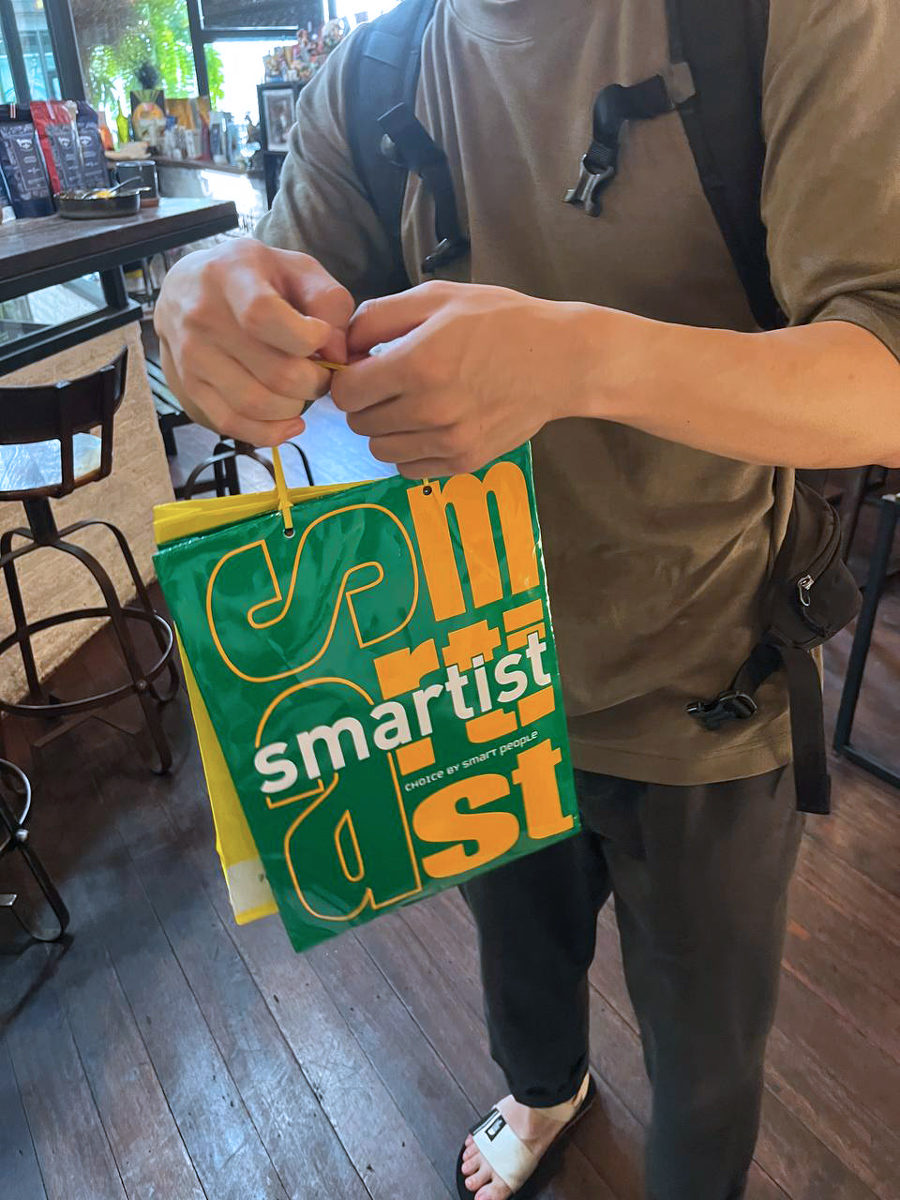
再利用複寫紙變身購物袋為返回的慢遞件HQL-543包裝 // 照片自:NAMKHEUN(漲潮)小組的Victoria
購物和環保 🛍️ Shopping and Sustainability
展銷場MB (DD):你在慢遞紀錄中写道:「突然意識到,即使在一萬米高空,你也無法逃避購物(機長不斷推薦免稅產品)」。您認為成為一名LIGHT LOGISTICS的慢遞員能為這種不可避免作出貢獻嗎?
You wrote that you “suddenly realised that even at 10,000 metres in the air, you can’t escape shopping (the captain kept recommending duty-free products)”. Do you think that being a LIGHT LOGISTICS courier contributes to that inescapability?
TONG: 在這種情況下,我想也不盡然,因為我先是計劃了我的旅行,然後因為我覺得我的行李箱還有多餘的空間,就報名當了慢遞員。所以,造成這種不可避免的,其實是我的香港之行,或是使我旅行的原因。無論我是否是一個慢遞員,我也會乘搭同一班航機,聽到同様的廣告宣傳。
In this case, I guess not really, because I planned my trip first, then I signed up as a courier since I reckoned I had extra space in my suitcase. So the cause of this inescapability is actually my trip to Hong Kong or the reason why I had this trip. Whether I were a courier or not, I would take the same flight and hear the same duty-free promotion.
(这个问题其实让我意识到 LIGHT LOGISTICS 对可持续发展的贡献。起初,我以为不通过传统物流公司送货,就意味着送货过程中没有额外的碳排放。但实际上,把一个包裹从 A 地送到 B 地,无论如何都需要能源。所以,即使我带着包裹,包裹也会增加我飞行时的重量,因此还是会燃烧更多的燃料,产生额外的碳排放。另外,从碳排放的角度来看,用货轮运输可能更好一些。不过,我想长途国际包裹通常都是用飞机运输的,因此,在我的行李箱空余中放一些包裹,肯定會優化整體運輸效率。)
(This question actually led me to realise how LIGHT LOGISTICS contributes to sustainability. At first, I thought a delivery without a traditional logistics company would mean no extra carbon emissions on the delivery. But actually, the action of taking a package from A to B requires energy regardless. So even though I carried the package with me saving an extra trip, the package still adds extra weight to my journey, meaning more fuel is burned and extra carbon emissions are still present. Shipping with cargo ships might still be better in terms of carbon emissions. Though I guess long-distance, international packages are usually still transported by airplane anyway, so, filling up empty space in my suitcase with a few packages still definitely optimises the efficiency of transportation overall.)
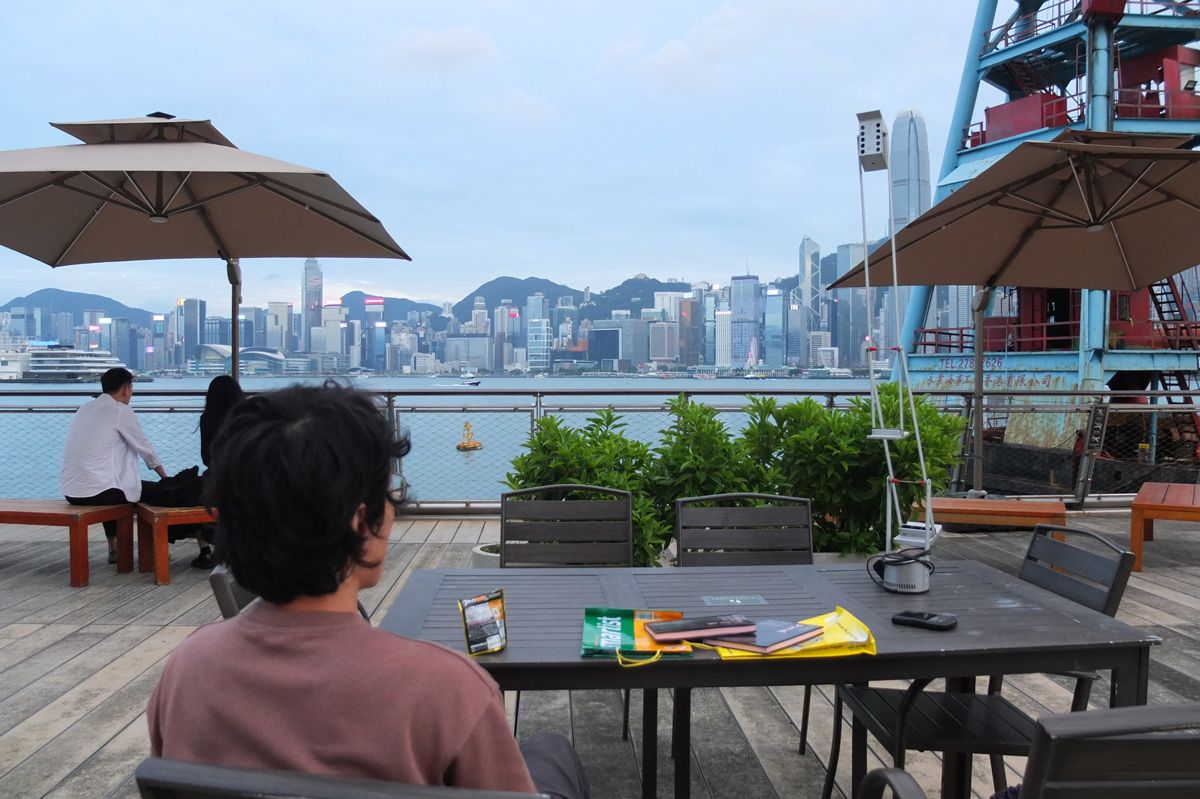
派件HQL-543的返程,回到香港
本地主義和權利 📍 Localism and Power
展銷場滿地圓 MDT (DD): 你怎麼看待庫拉圈(《出自西太平洋上的航海者》)和國際物流(比如國際海運)的?一者交換“無價值”的貝殼手環,另一者有時候“交換”巨額但只有海運公司高層和船長才知道的——集裝箱裡的軍火。
What do you think of the Kula ring as written about in Argonauts of the Western Pacific in relation to international logistics such as global shipping? One involves the ‘valueless’ exchange of shell bracelets, and the other may sometimes ‘exchange’ enormous amounts of weapons by surreptitious means that only the upper levels of shipping company management and captains will know of.
TONG: 這個庫拉圈我是第一次聽說,懂得不多,我只是在網絡上搜索看了看。很有意思,表面上看手鍊和項鍊不是被用來買賣的,但我覺得是有很大價值的。我在維基百科里看到,一個人所有的手鍊和項鍊象徵著這個人的社會地位和威望,chief可能會有上百個庫拉夥伴,而普通人可能只有幾個。我覺得手鍊和項鍊就相當於「資本」,擁有更多的資本或許能在庫拉圈「呼風喚雨」。我認為這反映了人類的power motive(the need to have an impact on other people),然後或許這可以和軍火運輸聯繫起來。因為我感覺國家之間結盟,相互運送武器,發動戰爭,大都是為了自己在國際上的地位,是為了維持或擴大自己的power。當然,不僅僅是武器,金錢更代表著power。所以人們想要賺更多錢,從而把生產轉向勞動力便宜的地區,從而國際物流越來越繁忙。
It’s the first time that I’ve heard about the Kula ring, so I can’t say I understand much—have only read a little bit online. It is quite interesting though, and it seems as if these bracelets and necklaces are not used for buying and selling, though they carry a lot of value. I saw on Wikipedia that a person’s bracelets and necklaces represent their social status and prestige, so the chief will have more than one hundred of them while ordinary people may only have one. These bracelets and necklaces are a form of ‘capital’, and having more capital may offer more leverage within the Kula exchange ring. I think this reflects the human motive for power and the need to have an impact on other people. Maybe this can connect back to the transport of military arms, because nationstates make alliances with one other, and trading weapons and instigating warfare is for the most part motivated by the need for status on the international stage—to maintain and increase one’s power. Of course, it’s not only weapons being transported; money itself represents power. People want to earn more and more money, and it is for economic reasons that production labour is moved to ever cheaper lands, therefore increasing the density and load on international logistics.
展銷場易拎 PORTABLE (DD): 在我們交接慢遞件時的對話中,你談到資本主義是我們在物流領域發現的大多數問題的根源。與此相反地,許多人提出了本地主義的觀點,強調購買本地產品是支持小規模生活的一種方式。考慮到當今全球貿易的運作方式,你認為這是一種具有可行性的方式嗎?或者說,我們外包化的全球性是必然的,那麼我們可以在物流方面進行怎樣的,更激進的思考呢?
During our handover conversations, you talked about capitalism being the root problem of most of the issues we are seeing in the world of logistics. Many people bring the idea of localism as a counter to that, to emphasise buying local as a way to support at a smaller scale of living. Do you think it is a viable possibility considering the way global trade works today? Or is our outsourced globality inevitable, and we can think more radically in terms of logistics, and how?
TONG: 其實我對物流瞭解不多,但我確實認為資本主義是有問題的(由於碳排放,物流也是其中的一部分),這也有其他的解決問題的提議,比如本地化發展(在後增長的理念下)。然而,要改變目前的狀況,我認為我們需要更多的東西來使其可行。在我看來,資本主義背後的問題是人性的問題。
Well, I actually don’t know much about logistics, but I do think capitalism is problematic (and logistics is part of that due to the carbon emissions). There are proposed solutions to this, such as localised development (within the idea of post-growth). However, to change the current situation, I think we need something more to make it viable. In my opinion, the problem behind capitalism is human nature itself.
如上所述,人都有權力動機(在不同程度上)。在資本主義中,金錢意味著權力,那麼有哪個富裕的一方願意為了一個更加平等的社會而放棄自己的權力呢?相反,人們可能會努力爭取比別人更多的權力。(我懷疑人們是故意在潛意識中使社會不平等的)有权力改變資本主義的人也是資本主義的受益者,因此對他們來說,改變資本主義並不划算。另一方面,我不確定是否每個人都喜歡較小的生活圈。如果沒有全球貿易,許多產品將無法在某地得到。(想想庫拉圈的參與者,他們有什麼?)然後一些產品可能因為昂貴的勞動力變得貴很多。(並沒有很多人能夠負擔)因此,人們的生活水平可能會受到影響,儘管生活水平並不意味著生活質量,但我懷疑有多少人意識到了這一點。
As I mentioned above, people have power motives (to different degrees). Money means power in capitalism, but which wealthy party would give up their power for a more equal society? Instead, people strive to have more power than others (I suspect that people subconsciously but deliberately make society unequal). People who have the power to make changes under capitalism are also the ones benefiting from it, so it’s not a good deal for them to make changes. On the other hand, I am not sure if everyone would like a smaller scale of living. Without global trade, many products will not be available in many places (think about Kula ring players, what do they have?), and some products might be much more expensive due to expensive labour. So people’s living standards might suffer, and even though living standard doesn’t mean the quality of life, I doubt many people realise this.
由於我對物流瞭解不多,我需要更多的研究才能從物流的角度進行激進的思考。但我想,只要涉及到人,我們就需要考慮人的需求,比如如何處理那些在我們推動變革時會失去利益的人。也許我們可以提出一個新的制度,讓他們仍然受益並保持他們的權力,或者我們團結人們,推動他們改變。
Since I don’t know much about logistics, I might need more research to think about a ‘radical logistics’. But I guess as long as it deals with people, we need to think about human needs, like how to deal with those who would lose their benefits when we push for change. Maybe we could propose a new system where those in power still benefit and maintain their power, or maybe we unite those with less power to push those with power to change.
如果非全球化世界是未來的發展方向,那麼我能想到的物流將不再是產品的運輸,而是思想、知識、方法和技術的運輸。
If a non-globalised world is the way to go, then what I can think for logistics is that it will be less about transporting products and more about transporting ideas, knowledge, methods, and techniques.
展銷場滿地圓: 如果這個地球沒有了海關和貿易稅,你想像中的物流運輸會變成什麼模樣?
If there were no customs or commercial tax, how do you think international transport and logistics would change?
TONG: 因為我所關注的物流主要就是其導致的碳排放,所以先不說海關和貿易稅,就環保角度考慮,我想一個健康的未來會不會其實沒有多少國際物流。
如果沒有海關和貿易稅意味著貿易往來更自由,這會不會讓世界上地區發展更不平衡,the global south會不會更徹底的成為世界工廠被壓榨。
不過我能想象到的還有一種情況也會使得海關和貿易稅消失,那就是全球一家親了。
Because I am mostly focused upon the aspect of carbon emissions within international logistics, I cannot speak much about customs or commercial taxation, only about the environmental aspects. I would consider rather whether or not global logistics would exist at all in a healthier future scenario. If there were no customs or commercial taxes, it would insinuate that trade has become even more free, and this might lead to even greater inequality between different regions of the world. The global south might become even more oppressed as the world’s factory. But I can also imagine another scenario where customs and taxation might not exist, and that would be one of a world without borders.
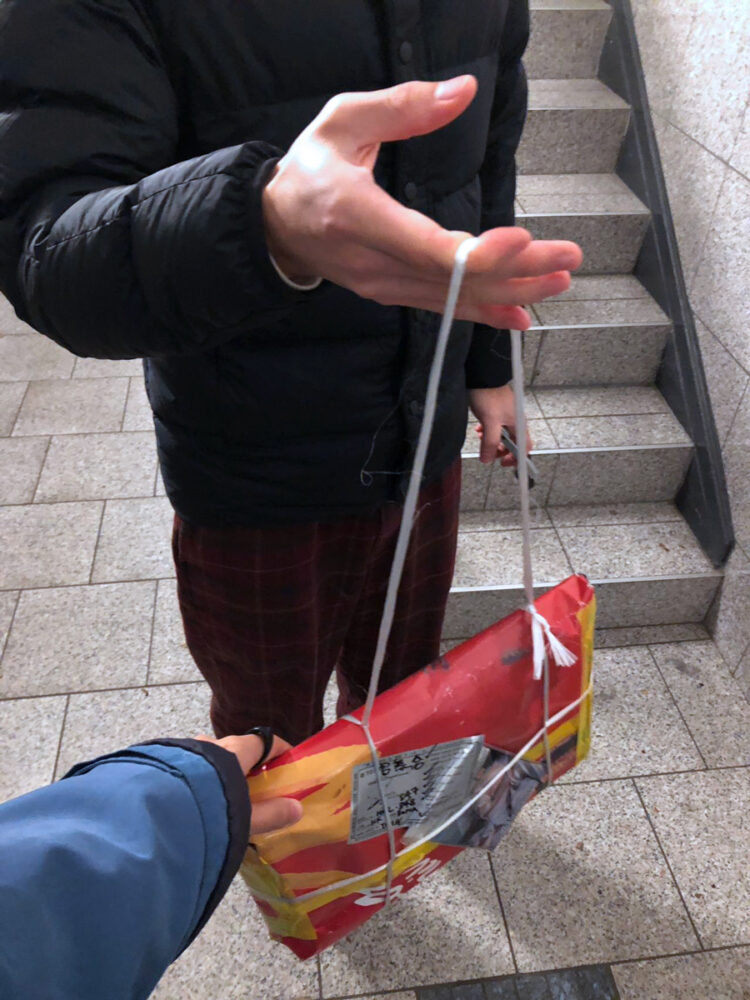
TONG在科隆經手 HQL-547給收件人兼慢遞員CAO // 照片自:CAO
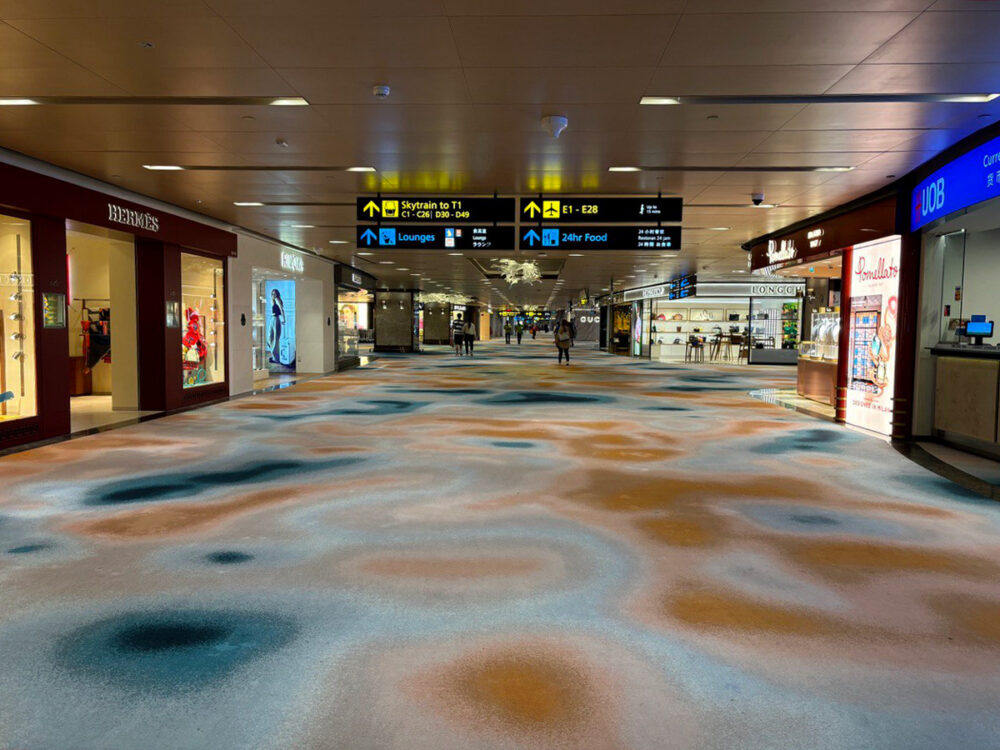
“資本主義雲紋綢緞” // 在新加坡轉機,為HQL-547 and HQL-548拍攝,自:TONG
展銷場滿地圓 MDT (DD): 你知道這些國際貿易/運輸公司有什麼奇怪的供奉,出發前會拜拜什麼嗎?赫爾墨斯或者說他的鞋?
Do you know if global trading or shipping companies have any weird rituals, such as any form of prayer before embarking? Like Hermes or maybe his winged sandals?
TONG: 這個我就更不知道了,不好意思了,我都不知道還要供奉。但我猜供奉是為了祈求平安吧,這讓我聯想到LIGHT LOGISTICS對貨物的安全送達有多在乎,還有LIGHT LOGISTICS的可靠性可不可控,還有客戶對此的態度。
Sorry, but I really don’t know anything about this! I didn’t even know there were any kind of ritual practices involved. But I assume any such practice would be to ensure the smoothness and safety of a journey, and this makes me think of how LIGHT LOGISTICS does have high regard for the safety of its goods, and about how to control the reliability of its deliveries. What do their readers think of it?
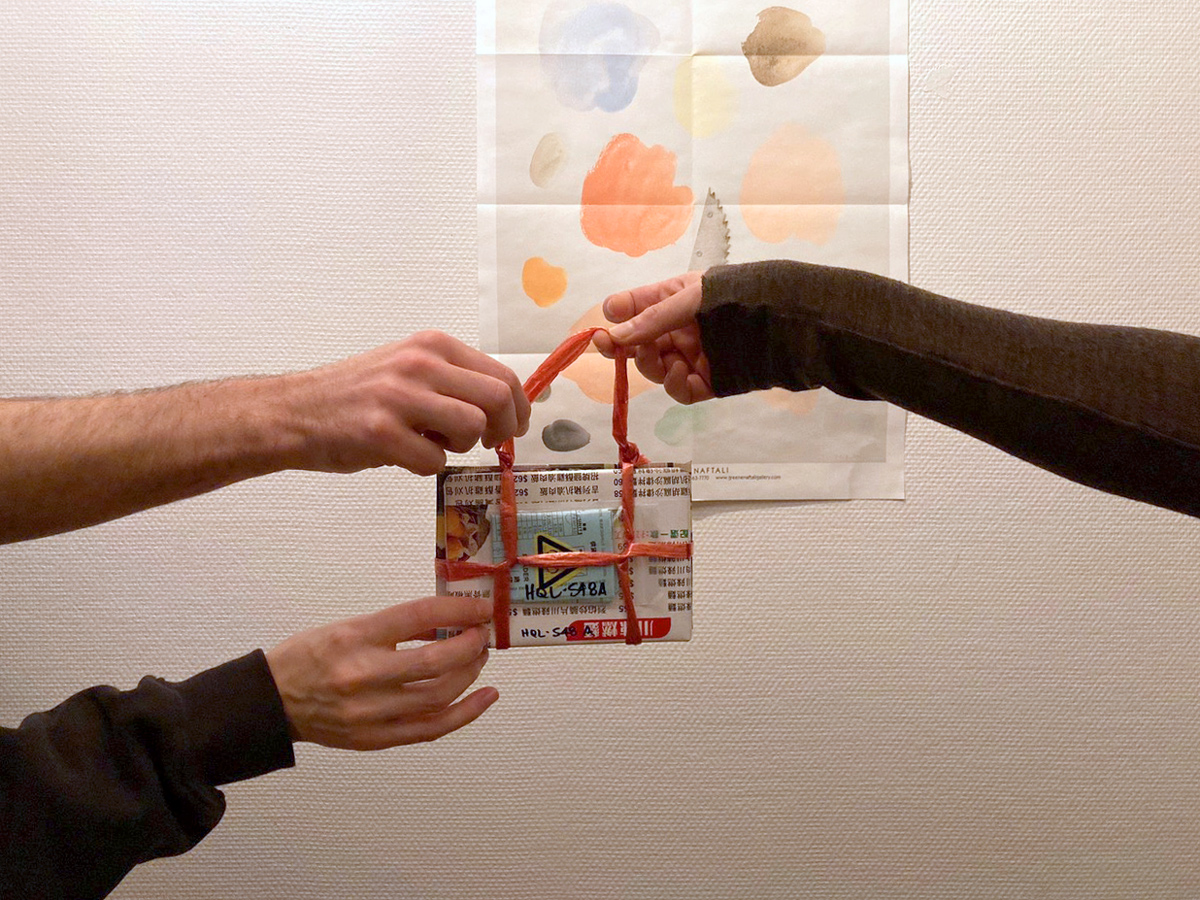
來一起攜手慢遞HQL-548,2023年11月,科隆
給展銷場回饋 📝 Feedback for Display Distribute
展銷場易拎: 既然您是專家,請根據您與作為LIGHT LOGISTICS同某人的經驗給我們一些建議!
Since you are an expert, please give us some advice based upon your experience with LIGHT LOGISTICS!
TONG: 哈哈,我可能沒有資格作为專家,但我會盡力表達自己的觀點。我會說說我喜歡的東西,然後說說我注意到的一些局限性。
Haha, I might not be qualified to be an expert, but I will try to express myself. I will say the things that I like and then a few limitations I notice.
回到我一開始說的,我之所以參加,是因為我認為一个活動本身的特質是推動人們行動、改變人們行為的关键,做LIGHT LOGISTICS的慢遞員的这个活動吸引了我。很多活動都能吸引人,但並不是每項活動都有同樣的結果。對某些人來說,駕駛跑車是一項有趣的活動。跑車行动敏捷,駕駛者便有控制感;跑車速度快,駕駛者有興奮感;它比其它車快,駕駛者覺得自己強大有力;它價格昂貴,在某種程度上這指示了社會地位,駕駛者會覺得自己比其他人優越。但跑車排量大、噪音大,對環境和居民造成不良後果。LIGHT LOGISTICS則是不同活動。首先,它提供给我了某種新奇,因为我從未嘗試過。其次,因為我不知道接下來會在哪裡遇到誰,它包含了某種令人兴奋的刺激。第三,它讓我認識更多的人,聽到更多的想法。第四,它符合我減少碳排放的價值觀(如果我的行李箱還有一些空間,為什麼不多帶點東西呢?不然最后这些原本能够被捎带的东西会因为累加在一起而再被一个航班运送)。 另一方面,我想不出LIGHT LOGISTICS有什麼重大的負面影響。也許是我必須攜帶的一點額外重量和交接書籍所花費的時間,但這遠遠不能抵消LIGHT LOGISTICS的積極方面。
Back to what I said at the beginning, I participated because I think the activity itself (the quality it has) is one key to drive action and change people’s behavior, and the activity of LIGHT LOGISTICS courier attracted me. Many activities attract people, but not every activity has the same consequence. Driving sports cars can be a fun activity for some people. It is responsive, drivers have the feeling of control; it is fast, drivers get excited; it is faster than other cars, so drivers feel they are powerful; it is pricey, so to some extent this indicates social status making drivers may feel superior to others. But sports cars have high emissions and are loud, so the activity leads to bad consequences for the environment and residents. LIGHT LOGISTICS is a different activity. It first provides a certain novelty because most people have never tried it. Second, it also contains some kind of excitement since a courier does not know who they will meet next and where. Third, it allows the courier to get to know more people and listen to more ideas. Fourth, it aligns with the value of reducing carbon emissions (If I have some space in my suitcase, why not take something extra? Otherwise, those add-on extras will have to make an additional trip). As far as any major negative consequences of LIGHT LOGISTICS, I can’t think of any. Maybe it is the little extra weight I had to carry and the time spent to hand over the book, but this is far from canceling out the positive aspects.
所以,這就是我欣賞 LIGHT LOGISTICS 的原因——LIGHT LOGISTICS的活动层面。
This is why I appreciate LIGHT LOGISTICS as an activity.
我喜歡的另一點是,LIGHT LOGISTICS 似乎是資本主義遊戲中的另一種遊戲。我可以想象,要站穩腳跟可能並不容易。作為一個看到資本主義存在許多問題的人,我很高興看到這樣一個項目存在。它代表了一種希望,一種可以真正挑戰資本主義的希望。
Another thing I like is that LIGHT LOGISTICS seems to be playing another game within the game of capitalism. I can imagine it might be not easy to stand its ground. As someone who sees many problems of capitalism, I am happy to see such a project exist. It represents a hope, a hope that capitalism can actually be challenged.
關於局限性,我注意到有兩個。第一個限制實際上是一個兩難處境,我們有機會宣傳 LIGHT LOGISTICS 的可持續性,但真正在意環保的人通常不會乘坐國際航班。其次,我知道很多歐洲人經常周遊世界,而在我的印象中,LIGHT LOGISTICS 的慢遞員大多有亞洲背景,因此也許有機會吸引更多的歐洲慢遞員,比如在網上商店中提供更多他們感興趣的書籍。不過,這也讓我猜想, LIGHT LOGISTICS 能如何擴大規模,或者說 LIGHT LOGISTICS 是否想要擴大規模。我可以想象,人工智能可以幫助實現某些流程的自動化,但我也在質疑,當更多的技術和更少的人工參與時,慢遞活動的整體體驗如何?
Regarding limitations, there are two I noticed. The first is actually a dilemma: there is an opportunity to advertise LIGHT LOGISTICS in terms of sustainability, but people who really care about the environment usually don’t take international flights. The second is that I am aware that many people in Europe travel around the world a lot, and I have the impression that most LIGHT LOGISTICS couriers are from Asian backgrounds, so there might be a chance to attract more European couriers, such as having more books of interest in the online shop. This also makes me wonder how LIGHT LOGISTICS can be scaled up, or if the project even wants to be scaled up. I can imagine AI may help in automating some processes, but I would question the overall experience of a courier’s activity when there is more technology and less humans involved.
此外,當我看到越來越多的中國海外留學生因旅行在微信群里發佈有償代運的信息時,我也在想,有多少慢遞員的動機是出於這行動本身,又有多少動機是為了購物折扣呢?以貨幣回報為動機一般意味著對社會無利好的價值觀(一些行為變化研究的研究者已經提出警告,我們需要倡導自我超越的價值觀)。價值觀對人類行為也非常重要。我們的價值觀會讓我們避免做 “錯誤 “的事情,就像重視可持續發展的人可能會讓自己遠離駕駛跑車,即使它超級有趣;又比如,庫拉圈的參與者看重慷慨,這讓庫拉圈成為可能。
In addition, as I am seeing more and more Chinese overseas students posting paid delivery offers in WeChat groups when they travel. So I also wonder how many LIGHT LOGISTICS couriers are motivated by the activity itself and how many are simply by the 12% discount reward. Monetary incentives usually imply values that are not beneficial to society (some researchers in behavioural change research have already warned that we need to advocate self-transcendence values). Values are very important to human behavior as well. Our values keep us from doing the ‘wrong’ thing. For example, people who value sustainability might keep away from driving sports cars even though it can be super fun, or Kula ring traders value liberality which enables the Kula ring.
總之,我的參與非常積極,我會向我周圍的人推廣,而且下次旅行時還會參加!
To conclude, my participation was quite positive. I will advertise it to the people around me and participate again next time when I travel!
– – – – – – – – – –
部分英譯中 SELECT EN to CN TRANSLATION // 大雨相 lß
部分中譯英 SELECT CN to EN TRANSLATION // 易拎 PORTABLE
「月度慢遞員」是一剛剛冒芽的系列,來連結我們的運動和我們的想法——來分享我們對敢於去旅行亦為「後勤慢遞」慢遞員們的剩餘空間的感激欣賞。早先的月度慢遞員有paperbridgeee(2020年9月)和JING(2023年11月)。
“Courier of the Month” is a burgeoning series to connect our movements and our ideas—to share our appreciation for the daring journeys and surplus space of LIGHT LOGISTICS couriers. Previous couriers-of-the-month include paperbridgeee (September 2020) and JING (November 2023).
